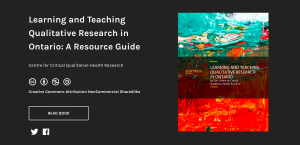In our teaching, we challenge the premise that qualitative research is a toolbox of methods or techniques. Since the topics taken on by qualitative researchers in the health field are typically social in character, we believe students need social theory to frame their studies, interpret data and to re-conceptualize research questions. To optimize the potential of qualitative research, we teach students the multiple paradigms of knowledge production, the need for epistemological and methodological congruence, and the ability to think critically and creatively.
Centre for Critical Qualitative Health Research
Doing Science Differently

